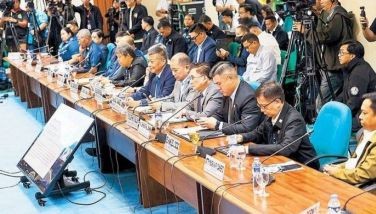Reason to rejoice

Farmers adversely affected by low palay prices after the country moved from quantitative import restrictions to rice tariffs finally have a reason to look forward to after Sen. Cynthia Villar revealed that the Bureau of Customs had already collected P10.7 billion from rice imports from March to Sept. 20.
The amount collected will finance the Rice Competitiveness Enhancement Fund (RCEF), a component of the Rice Tariffication Law.
During a recent Senate hearing, Finance Secretary Carlos Dominguez said the amount collected can be reinvested in the assistance program, which includes cash transfers to palay farmers.
Last August, the BOC collected only a total of P5.9 billion in tariffs from 1.43 million metric tons of rice imported by private traders following the implementation of the RTL in March.
Revenues from the opening up of the rice market will likely yield P15 billion this year, exceeding the P10-billion target under the law, according to Customs deputy commissioner Edward Buco.
For her part, Villar said this a very positive development for Filipino farmers, adding that if she finds the RCEF program to be successful over six years, she will move to expand it.
Villar, the main proponent of the RTL and chairman of the Senate committee on food and agriculture, said tariff revenues from rice imports in excess of P10 billion shall be appropriated by Congress will be used for providing direct financial assistance to small farmers, titling of rice lands, expanding crop insurance, and carrying out of crop diversification programs. Bulk of the RCEF will be used to modernize rice farms and support the government’s goal of increasing the sector’s productivity.
She expressed support for House Speaker Alan Peter Cayetano’s proposal to realign at least P2 billion under the proposed P4.1-trillion budget so the Department of Agriculture can buy more palay stocks from rice farmers.
Politics threatens Phl export crop
Cavendish bananas remain one the country’s biggest foreign exchange earners.
Primarily grown in Mindanao, these bananas contributed around $1.3 billion from January to November in export earnings last year.
But unless our government takes action, this major agricultural export may soon be a thing of the past.
One of the biggest threat facing the industry right now is the emergence of fusarium wilt which had wiped out banana plantations in Panama and has threatened other Cavendish banana producers in Latin American countries. Reports show that over 15,000 hectares of banana plantations which are mostly grown by small growers had been destroyed by the Panama disease which is caused by soil-borne fungi.
Fortunately, corporate farms like Tagum Agricultural Development Corp. (Tadeco), Sumifru and Dole have so far managed to keep their plantations away from this disease by establishing quarantine stations in their plantations. The Department of Agriculture has also warned against the disease and has enforced all available options to control the dreaded fungal menace.
Unfortunately, in Davao del Norte where most of these bananas are grown, newspapers have reported that newly elected governor Edwin Jubahib, together with government personnel and military forces, have used heavy equipment provided by the provincial engineers to attempt to dismantle the quarantine stations, particularly those of Tadeco.
Reports reveal that when he was chief of staff of then House speaker Pantaleon Alvarez, Jubahib also led a contingent of DPWH and policemen allegedly on orders of a congressman from Surigao del Sur to dismantle the same stations.
Both attempts at dismantling the quarantine stations did not materialize as Tadeco employees resisted the moves.
If Tadeco’s farms are affected by the disease, then the entire banana industry in Davao del Norte will be wiped out.
The Philippine banana industry has regained its position as the second biggest exporter of Cavendish bananas in the world. The country has the biggest share of the Japanese marker and enjoys preferential trade with China. We cannot simply allow this industry to die. This is a matter that the national government, particularly the President as well as the DILG top brass, should look into, especially if the LGU, the police and the military are involved.
No to pork in budget
The House of Representatives of the 18th Congress is turning out to be much, much more than what many expected.
More than two months after its first regular session opened, we have learned that around 5,000 bills have already been filed. But more importantly, most of the tax reform measures and economic reform bills outlined by President Duterte in his fourth State of the Nation Address have progressed swiftly in the respective committees and have been approved on third and final reading.
Just last Sept. 20, the House approved on third and final reading the 2020 General Appropriations Bill (GAB), minutes after the plenary passed the same measure on second reading. It took just nine straight session days, some lasting for 10 hours, to have pass the budget bill in record time.
On Aug. 20, Package 2 Plus of the President’s Comprehensive Tax Reform Program (CTRP) under House Bill 1026 was approved. The bill aims to further increase taxes on alcohol products and electronic cigarettes, such as heated tobacco and vaping products.
Also last Sept. 9, the House gave the green light to the fourth CTRP package or the Passive Income and Financial Intermediary Taxation Act (PIFITA), which aims to simplify taxes on capital income and financial services, and HB 300, which amends the Foreign Investments Act by allowing foreign investors to own small and medium-sized enterprises with a minimum paid-up capital of less than $100,000 if it involves advanced technology, or if it employs at least 15 direct employees.
Four days later, the House approved HB 4157 or the proposed Corporate Income Tax and Incentives Rationalization Act (CITIRA), which represents Package 2 of the CTRP.
Meanwhile, the House ways and means panel has approved last Sept. 11 the substitute bill for Package 3 of the CTRP, which aims to reform the system of property valuation in the country.
Also, amendments to the Retail Trade Liberalization Act was approved by the House committee on trade and industry last Sept. 23. HB 78, which contains proposed amendments to Public Service Act to allow foreign ownership of certain public utilities, was sponsored on the floor last Sept. 4.
House Speaker Allan Peter Cayetano deserves commendation for transforming the body into what is now described as a relevant, responsible and reliable Congress.
Cayetano has assured critics that the 2020 GAB remains free of pork and illegal insertions, as well as parked funds, adding that if there are, they will remove it and that everyone is free to scrutinize the House-approved budget bill.
For comments, e-mail at mareyes@philstarmedia.com
- Latest
- Trending































